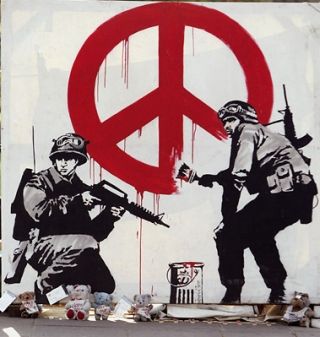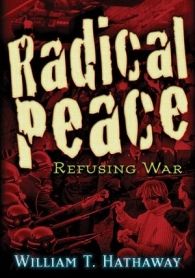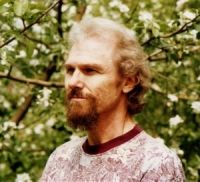
Publisher:
Bonnie King
CONTACT:
Newsroom@Salem-news.com
Advertising:
Adsales@Salem-news.com

~Truth~
~Justice~
~Peace~
TJP
Feb-05-2011 17:34

 TweetFollow @OregonNews
TweetFollow @OregonNews
RADICAL PEACE: People Refusing War
Tim King Salem-News.comCandid thoughts from Salem-News.com writer William Hathaway about his new book, and his life as a combat veteran turned peace activist.
 War and Peace - This work was part of a peace protest outside the Houses of Parliament on 11 May 2006 in London. Courtesy: Times Bruno Vincent / Getty |
(SALEM, Ore.) - Salem-News.com recently published "SAMs for Uncle Sam," a chapter from RADICAL PEACE:
 Visit: trineday to order a copy. |
Just released by Trine Day, the book presents the first-person experiences of war resisters, deserters, and peace activists in North America, Europe, Iraq, and Afghanistan.
RADICAL PEACE has aroused controversy because of its favorable portrayal of illegal resistance to war: helping soldiers to desert, destroying computer systems, trashing recruiting offices, burning military vehicles, and sabotaging defense contractors.
Conservative critic Joanne Eddington described it as, "Loathsome... further evidence that the hatred of America is reaching hysterical dimensions."
On the other side of the political spectrum, Noam Chomsky described it as, "A book that captures such complexities and depths of human existence, even apart from the immediate message."
Hathaway is an award-winning author, a Special Forces combat veteran turned peace activist, and an adjunct professor of American studies at the University of Oldenburg in Germany.
He has just joined Salem-News.com as a contributing writer, and we are presenting an interview with him now.
More biographical information is available on our staff page.
Interview with Author, William Hathaway:
 Prof. William Hathaway |
Salem-News.com: What made you write RADICAL PEACE?
Hathaway: I wanted to convince people — including myself — not to give up on their efforts to end this terrible violence. So many people have retreated into apathy and futility after Obama continued the aggression he'd pledged to stop. Their disappointment is turning to despair. Obama has shown himself to be another imperialist killing thousands of people just to maintain US power in Iraq and Afghanistan.
A similar betrayal of democracy occurred in 2006 when the Democrats gained control of Congress by pledging to end the war. Instead those same politicians then voted a huge increase in military spending and supported US troop surges.
The sad fact is that American voters don't control our government. Corporations do. The government represents business, not us. If business needs cheap oil, the president and congress will make war to get it, with time-out every few years for some campaign rhetoric about peace. It's obvious now their rhetoric is lies.
These swindles have led to a voter rejection of both parties. Since elections, demonstrations, and petitions have proven ineffective, people are searching for alternative ways to end the war.
Salem-News.com: Have you given up on politics?
Hathaway: Many peace activists have given up on the major political parties. Obama's morphing into a war president was the last straw. It's clear now that both parties are designed to prevent basic changes, to divert the public's demand for change into dead-end streets that don't challenge the power structure.
The Democratic Party exists to drain our potentially radical energies off into superficial reforms that actually strengthen the establishment.
Salem-News.com: What does the group you portray in RADICAL PEACE have to offer instead?
Hathaway: Now that changing the system from within has failed, their program is sedition, subversion, sabotage: direct action to bring the system down so a better one can be built.
They're helping soldiers to desert, destroying computer systems, trashing recruiting offices, burning military equipment, and sabotaging defense contractors. As criminals for peace, they're defying the Patriot Act and working underground in secret cells to undermine the US military empire.
Salem-News.com: Those actions seem quite violent. How can they call themselves peace activists?
Hathaway: Violence means harming living creatures. It's only because our society sees property as more important than people that it labels destroying property as violence.
They are destroying the government's means of violence, the equipment it uses to kill people. And they're very careful not to injure anyone while they're doing that. In other words, they'll throw a rock through the window of an army recruiting office, but they won't throw a rock at the recruiter.
They don't have anything against him as a person. And they don't have anything against the police as people. It's the system they're trying to break, and breaking its windows, burning its trucks, and zapping its electronics helps with that.
Setting bombs and burning buildings where people could be inside can't achieve anything worthwhile. It just reproduces the same mentality they're trying to change.
Rather than randomly smashing windows and torching autos, they restrict their activities to institutions that support or profit from the war.
Their goal is to make the war too expensive to continue, to convince the politicians they don't have enough money to conquer Iraq and Afghanistan. A few acts of sabotage won't do that, but thousands can. Government and corporate resources are limited.
Taxes and the deficit are already so high that they're crippling the economy. Every dollar the government has to spend keeping things running here is one they can't spend killing people overseas.
The militants believe that direct actions like these aren't a substitute for traditional organizing, but in critical situations like the present they can supplement it. Sabotage won't build a new society, but it can help weaken the old one so the new one can be built.
Salem-News.com: Many people are afraid those sorts of actions will result in a government crackdown that will make our lives worse.
Hathaway: The crackdown is already happening. Our lives have been slowly getting worse for 30 years. Young workers in the USA are earning less than their parents did. And that trend is spreading now to Europe.
The "have a nice life" days are over. We're beginning to get the same treatment as people in the client states.
That's the consolidation stage of capitalism we're in. It swallows up small businesses and independent contractors and turns almost everyone into a worker competing for a decreasing number of low-wage jobs.
The libertarians and tea partyers are mad as hell about that because they're losing their privileged position. They want to turn the clock back to the old competitive stage of capitalism, when they still had a chance to make it big. But that's a nostalgic illusion — those times are gone.
The liberals have their own nostalgic illusion — that we can turn the clock back to Keynesian capitalism. Back then, from the 1950s through the '70s, wage increases were permitted because they stimulated consumption.
But that was only true as long as the primary market for products was the home country. Now the market is global, so low price is more important, which means wages have to be held down.
The international workforce is being leveled, and we're on our way to a globalized proletariat. The challenge of capitalism then is going to be to keep us separated. Their think tanks are no doubt working on ways to do that now.
Our worsening situation — working long hours for low pay, living in a deteriorating society, raising children amid fear and hostility — is caused by the same forces that drove us to war.
Capitalism now manifests as invasion in Iraq and Afghanistan, as privatization and impoverishment in Latin America, and as the destruction of the middle class in the industrial nations. It's the same system operating in different environments.
Rather than sheepishly obeying in hopes of avoiding more punishment, we need to actively resist and take back the power that's been usurped from us. This struggle won't be comfortable, but it will be meaningful.
To go along with the system in hopes of having it easier is collaboration, a living death. Better to have a vivid life of opposition. Rebelling is revitalizing.
We don't need to live by dominating other countries. In fact we can't live that way anymore. We have to change. And that means taking our government back from the corporations that now run it and restructuring them both to serve human needs instead of private profits. Until that happens we don't have a chance for lasting peace.
Salem-News.com: Why do most people reject these ideas?
Hathaway: Most people identify with the system. It's all they know, so they accept it. They're threatened by the thought of major changes.
They're afraid of losing what little they have, so they don't want to defy the power structure. Children are raised to love their country. In school they are taught a very selective view of our history and almost nothing about foreign policy.
And they're put through patriotic rituals that make them identify the country with their family, especially their fathers, because it's a patriarchal structure. So they react very defensively when the country is criticized That's emotionally painful to them, like an attack on their family.
Salem-News.com: Won't these efforts to weaken the US military just lead to a victory of the terrorists?
Hathaway: They probably will take over, and that's unfortunate. But the USA created these terrorists. We trained and armed bin Laden and the Taliban to kill communists in Afghanistan.
The civil war we sponsored there killed two million people and brutalized a whole generation of Afghans. We turned these fanatics into the most powerful force in the country, so of course they took over the government. And the USA didn't object to them at all until they refused to let us build a pipeline through the country.
Only then did the corporate media start portraying them as these terrible monsters who need to be destroyed.
In Iraq we helped Saddam Hussein come to power and supported him militarily, until he started opposing us. In Iran we overthrew their government in the 1950s because they planned to nationalize the oil industry.
We installed the Shah and kept him in power as one of the most brutal dictators in the world. In Libya right after al-Gaddafi came to power as a socialist and nationalized the oil, we started economic warfare against him, subverting his government and trying to overthrow him. We turned him into an enemy.
The list goes on and on. In every country where we now have anti-American terrorism, the USA first did terrible things. That's why they hate us. Now we're paying the price for our aggression.
In the USA we blank out this history. But people in those countries are very aware of it. And they're not putting up with it anymore. What we call terrorists are really just people fighting back with the only weapons they have.
Considering the atrocities of US foreign policy, America needs to lose this war — for its own sake and for the sake of the world. We have to stop dominating other countries.
Salem-News.com: If the insurgents take over again, won't they keep attacking us at home?
Hathaway: Our government tries very hard to make us believe that. There's a huge PR campaign to convince us that the Taliban and al Qaeda want to conquer America, force us all to become Muslims. They are portrayed as insane mad-dog killers that we need to exterminate. But that's nonsense.
Their actual demands are never published in the Western media because they're so reasonable. Basically they come down to, "Go home and leave us alone. Pull your soldiers, your CIA agents, your missionaries, your corporations out of Muslim territory. If you do that, we'll stop attacking you."
Nothing about destroying the West or forcing it to become Islamic. Just that the West should stay in the West. They are fighting a defensive war.
Salem-News.com: What about Israel?
Hathaway: They consider that Muslim territory, and it's been Muslim ever since the days of Mohammed. To them the formation of Israel was another European invasion of their area.
Just because ancestors of the Jews lived there two thousand years ago doesn't give them any claim to that land today. The Romans forced them out back then, not the Arabs. And the Arabs didn't have anything to do with the Holocaust. So why should their land be taken and millions of Arabs forced out?
If the Jews needed a homeland, it should have been taken from the Germans. That would've been fair. But making the Arabs pay for the sins of the Germans is a fundamental injustice. And the Arabs are refusing to accept it.
There won't be peace until Israel gives up major territory or gives up the idea of a Zionist state.
Salem-News.com: What makes you think that wars are a result of the system and not just of human nature?
Hathaway: Again, we're bombarded with propaganda to convince us of that. Conservatives say war is human nature, capitalism is human nature, our current gender roles and family structures are human nature.
That same sort of person in previous centuries used that argument to support slavery, the divine right of kings, the subjugation of women. But those things were changed, and we can keep on making changes. I think our drive to change things shows our real human nature: to take control of our fate and improve our situation.
Salem-News.com: But if you look at history, it's been one war after another.
Hathaway: That's the history only of our patriarchal civilization The early matriarchal civilization of south-eastern Europe enjoyed centuries of peace.
On many of the Pacific islands war was unknown. And the ancient Vedic civilization of India had meditation techniques that preserved the peace. The Transcendental Meditation program is using those today to reduce stress in society.
War is not inevitable. Our human genes don't force us to make war on each other.
Salem-News.com: But our closest genetic relatives, the chimpanzees, make war. Doesn't that say something about our evolutionary heredity?
Hathaway: It's true that in certain situations chimpanzees do raid neighboring colonies and kill other chimps. Those studies on killer apes got enormous publicity because they implied that war is inevitable, it's hardwired into human nature. Most scientists weren't claiming that, but the mass media kept reinforcing that message.
But further research led to a key discovery: the chimps who invaded their neighbors were suffering from shrinking territory and food sources. They were struggling for survival.
Groups with adequate resources didn't raid other colonies. The aggression wasn't a behavioral constant but was caused by the stress they were under. Their genes gave them the capacity for violence, but the stress factor had to be there to trigger it into combat.
This new research showed that war is not inevitable but rather a function of the stress a society is under. Our biological nature doesn't force us to war, it just gives us the potential for it. Without stress to provoke it, violence can remain one of the many unexpressed capacities our human evolution has given us.
Salem-News.com: But isn't stress inevitable in life?
Hathaway: That assumption is deeply entrenched in our society. Many of our social and economic structures are based on conflict. Capitalism's need for continually expanding profits generates stress in all of us.
We've been indoctrinated to think this is normal and natural, but it's really pathological. It damages life in ways we can barely perceive because they're so built into us.
We don't have to live this way. We can reduce the stress humanity suffers under. We can create a society that meets human needs and distributes the world's resources more evenly.
We can live at peace with one another. But that's going to take basic changes. And I hope RADICAL PEACE points the way to some of those.
SAMs for Uncle Sam
From the book
RADICAL PEACE: People Refusing War
By William T. Hathaway
Published by Trine Day 2010
William T. Hathaway is a Special Forces combat veteran turned peace activist. His other books include A WORLD OF HURT (Rinehart Foundation Award), CD-RING, and SUMMER SNOW. He is an adjunct professor of American studies at the University of Oldenburg in Germany. A selection of his writing is available at: www.peacewriter.org.
Articles for February 4, 2011 | Articles for February 5, 2011 | Articles for February 6, 2011

Quick Links
DINING
Willamette UniversityGoudy Commons Cafe
Dine on the Queen
Willamette Queen Sternwheeler
MUST SEE SALEM
Oregon Capitol ToursCapitol History Gateway
Willamette River Ride
Willamette Queen Sternwheeler
Historic Home Tours:
Deepwood Museum
The Bush House
Gaiety Hollow Garden
AUCTIONS - APPRAISALS
Auction Masters & AppraisalsCONSTRUCTION SERVICES
Roofing and ContractingSheridan, Ore.
ONLINE SHOPPING
Special Occasion DressesAdvertise with Salem-News
Contact:AdSales@Salem-News.com

Salem-News.com:
googlec507860f6901db00.html

Terms of Service | Privacy Policy
All comments and messages are approved by people and self promotional links or unacceptable comments are denied.
Ron August 20, 2011 9:10 am (Pacific time)
great story. I learned the evil ways of war, deserted and now act/teach peace, metaphysics.
Vic February 9, 2011 11:33 am (Pacific time)
"Rather than sheepishly obeying in hopes of avoiding more punishment, we need to actively resist and take back the power that's been usurped from us. This struggle won't be comfortable, but it will be meaningful. To go along with the system in hopes of having it easier is collaboration, a living death. Better to have a vivid life of opposition. Rebelling is revitalizing" Very very well put !
[Return to Top]©2025 Salem-News.com. All opinions expressed in this article are those of the author and do not necessarily reflect those of Salem-News.com.